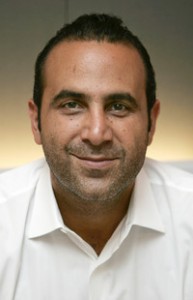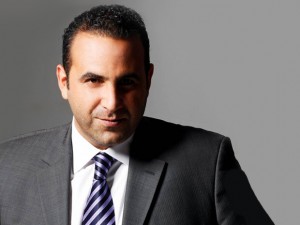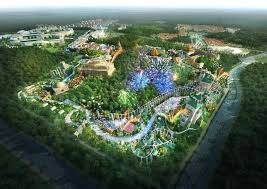 Is Sam Nazarian becoming a legend in his own mind? You have to wonder when you read that he’s had a statue of himself erected in the front of SLS Las Vegas. Sure, Bob Stupak did the same thing at Stratosphere, but Stupak was a notorious eccentric while Nazarian is supposed to represent a new breed of businessman.
Is Sam Nazarian becoming a legend in his own mind? You have to wonder when you read that he’s had a statue of himself erected in the front of SLS Las Vegas. Sure, Bob Stupak did the same thing at Stratosphere, but Stupak was a notorious eccentric while Nazarian is supposed to represent a new breed of businessman.
SLS is, more by necessity than choice, pursuing a bifurcated marketing strategy at its Strip hotel. On the one hand, it is taking the global view, appealing to what Nazarian calls his “tribe” — currently shaking its collective booty down at Hyde in Bellagio. “Our database has 5 million names, and the average age of our customer is 38 years old and they travel … And there are members of the tribe who are the affluent. To us, that tribe is in place as much in Hong Kong as it is in New York as it is in Las Vegas,” he says.
The other prong of the approach is to try and sell to locals, especially those who work on the Strip. Below-average prices are part of the appeal, as well as an SLS loyalty program: The appeal of the latter is a somewhat narrow, as you can only use it only in Los Angeles, New York and Miami, at least until Nazarian can build more hotels. (Shanghai, Philadelphia and Seattle are next.)
“Beyond that, you need to build relationships and create an emotional attachment,” adds Sarah Tanford, of UNLV‘s William F. Harrah College of Hotel Administration. Her dean, Stowe Shoemaker, thinks Nazarian has a real winner: “There’s a real uniqueness to the brand and to the property that you don’t find at other places. That will get the person in the door. What will build the loyalty will be the success of the service levels and what’s happening at the property.”
 While Nazarian sells himself as a master strategist with a grand plan in place, this profile suggests someone more scattered, living large in Vegas with a 20-car garage and a party-hearty lifestyle (which would certainly help him understand his target clientele). It purveys some urban mythology — such as the saw that nightclubs are going to overtake gambling as a source of income for the Strip. However, it also has its revealing moments, including a disclosure of the long-mysterious purchase price of the Sahara — $288 million — and how Nazarian managed to rebuild the property for just $415 million (wallpaper plays a critical role).
While Nazarian sells himself as a master strategist with a grand plan in place, this profile suggests someone more scattered, living large in Vegas with a 20-car garage and a party-hearty lifestyle (which would certainly help him understand his target clientele). It purveys some urban mythology — such as the saw that nightclubs are going to overtake gambling as a source of income for the Strip. However, it also has its revealing moments, including a disclosure of the long-mysterious purchase price of the Sahara — $288 million — and how Nazarian managed to rebuild the property for just $415 million (wallpaper plays a critical role).
“We’re going back to how Vegas started, where one operator manages a whole building and the customer experience,” Nazarian declares, yet he
expediently abandons that business model, selling his SLS hotels in Miami Beach and Beverly Hills to scare up quick cash. (Cost  overruns in Vegas perhaps? Property president Rob Oseland told me the oft-quoted $415 million price tag was no longer operative.) Stockbridge Real Estate, which owns 90% of SLS Las Vegas, and without whom Nazarian would just be a dreamer with a fistful of dollars, doesn’t get so much as a by-your-leave. Not a word. Nada. Zip. Zilch.
overruns in Vegas perhaps? Property president Rob Oseland told me the oft-quoted $415 million price tag was no longer operative.) Stockbridge Real Estate, which owns 90% of SLS Las Vegas, and without whom Nazarian would just be a dreamer with a fistful of dollars, doesn’t get so much as a by-your-leave. Not a word. Nada. Zip. Zilch.
More disconcertingly, The Naz goes haring off in pursuit of The Cosmopolitan of Las Vegas. What conceivable use could he have for that white elephant other than to burden SLS Las Vegas with massive debt and unneeded intramural competition? A deal like that could cut off SLS LV at the knees and you have to wonder what the heck Nazarian was thinking. Focus, Sammy Boy, focus.
Sushi. That ought to be the name of MGM Resorts International‘s dreamt-of Japanese casino. Sources tell Bloomberg News that CEO Jim Murren has been assessing the Tsukiji fish market (largest in the world) as a prospective casino site. Not only does it offer 57 acres, it adjoins the high-end Ginza shopping district of Tokyo. Public transit is also deemed better than in the high-tech, retail-rich Odaiba neighborhood (an alternate site).
A popular tourist and gourmand draw, Tsukiji will probably be relocated to a landfill in 2016, although the government would prefer to put a casino there. The appeal of Tsukiji is that one would be negotiating with one landowner (the city), not several as in Odaiba.
Whoops. In its zeal to get cracking on a $2.2 billion South Korea megaresort, Genting Group failed to mention in its paperwork that  there’d be a casino. That was all Jeju Island Gov. Won Hee-ryong needed to throw a wrench into the works. “Before deciding whether to give permission to the casino application, we need to create a supervisory body for casino operations in the province in consultation with the central government. To do that, it will take at least six months or one year.” That still leaves Genting plenty of time to get the casino, once built, open — but this has to be a major disappointment for the company.
there’d be a casino. That was all Jeju Island Gov. Won Hee-ryong needed to throw a wrench into the works. “Before deciding whether to give permission to the casino application, we need to create a supervisory body for casino operations in the province in consultation with the central government. To do that, it will take at least six months or one year.” That still leaves Genting plenty of time to get the casino, once built, open — but this has to be a major disappointment for the company.


Thanks for continuing to cover the SLS story, David. It’s interesting stuff.
Also, thanks for putting daylight between Bob Stupak and Nazarian. Stupak was one of a kind.
A big name in CA Gaming circles on Nazarian: “how much of Daddy’s money does he get to burn?”
We’ll see if this bet pays off. I mean, isn’t he essentially trying to cannibalize Cosmo?